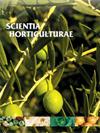Genomic identification and expression profiles during callus formation of LBD transcription factor genes in sweet orange (Citrus sinensis) and functional characterization of CsLBD17
IF 3.9
2区 农林科学
Q1 HORTICULTURE
引用次数: 0
Abstract
Lateral organ boundaries domain (LBD) is a plant-specific transcription factor. Here, we identified 37 LBD genes of sweet orange in the CPBD database, which were unevenly distributed on 7 chromosomes, and most of those were located in the nucleus. All CsLBD genes were divided into class I (31) containing five subclasses, and class II (6) containing two subclasses and associated with plant growth and development, plant hormones, defense and stress response. WGD/segmental duplication events primarily were confrimed to promote the development of the CsLBD gene family. CsLBDs were more strongly correlated with dicotyledonous plants than with monocotyledonous plants. Gene expression analysis showed that CsLBD16 and CsLBD17 genes in segment stem cultured in callus induction medium were higher than those in the other two media without auxin throughout the cultivation process. The N-terminal region of the CsLBD17 protein is responsible for the transcriptional activation of CsLBD17. Arabidopsis thaliana with overexpression of CsLBD17 showed stronger callus formation ability on CIM medium and stronger root growth ability on MS medium, indicating that it plays an important role in the development of calluses and roots.
甜橙(Citrus sinensis)中 LBD 转录因子基因的基因组鉴定和胼胝体形成过程中的表达谱以及 CsLBD17 的功能特性鉴定
侧器官边界域(LBD)是一种植物特异性转录因子。我们在 CPBD 数据库中发现了 37 个甜橙的 LBD 基因,这些基因不均匀地分布在 7 条染色体上,其中大部分位于细胞核中。所有 CsLBD 基因分为 I 类(31 个)和 II 类(6 个),I 类包含 5 个亚类,II 类包含 2 个亚类,与植物生长发育、植物激素、防御和胁迫反应有关。WGD/片段复制事件主要被认为促进了 CsLBD 基因家族的发展。与单子叶植物相比,CsLBD 与双子叶植物的相关性更强。基因表达分析表明,在整个培养过程中,用胼胝体诱导培养基培养的节段茎中的CsLBD16和CsLBD17基因表达量高于其他两种不含辅酶的培养基中的基因表达量。CsLBD17蛋白的N端区域负责CsLBD17的转录激活。过表达 CsLBD17 的拟南芥在 CIM 培养基上表现出更强的胼胝体形成能力,在 MS 培养基上表现出更强的根系生长能力,表明它在胼胝体和根的发育过程中起着重要作用。
本文章由计算机程序翻译,如有差异,请以英文原文为准。
求助全文
约1分钟内获得全文
求助全文
来源期刊

Scientia Horticulturae
农林科学-园艺
CiteScore
8.60
自引率
4.70%
发文量
796
审稿时长
47 days
期刊介绍:
Scientia Horticulturae is an international journal publishing research related to horticultural crops. Articles in the journal deal with open or protected production of vegetables, fruits, edible fungi and ornamentals under temperate, subtropical and tropical conditions. Papers in related areas (biochemistry, micropropagation, soil science, plant breeding, plant physiology, phytopathology, etc.) are considered, if they contain information of direct significance to horticulture. Papers on the technical aspects of horticulture (engineering, crop processing, storage, transport etc.) are accepted for publication only if they relate directly to the living product. In the case of plantation crops, those yielding a product that may be used fresh (e.g. tropical vegetables, citrus, bananas, and other fruits) will be considered, while those papers describing the processing of the product (e.g. rubber, tobacco, and quinine) will not. The scope of the journal includes all horticultural crops but does not include speciality crops such as, medicinal crops or forestry crops, such as bamboo. Basic molecular studies without any direct application in horticulture will not be considered for this journal.
 求助内容:
求助内容: 应助结果提醒方式:
应助结果提醒方式:


